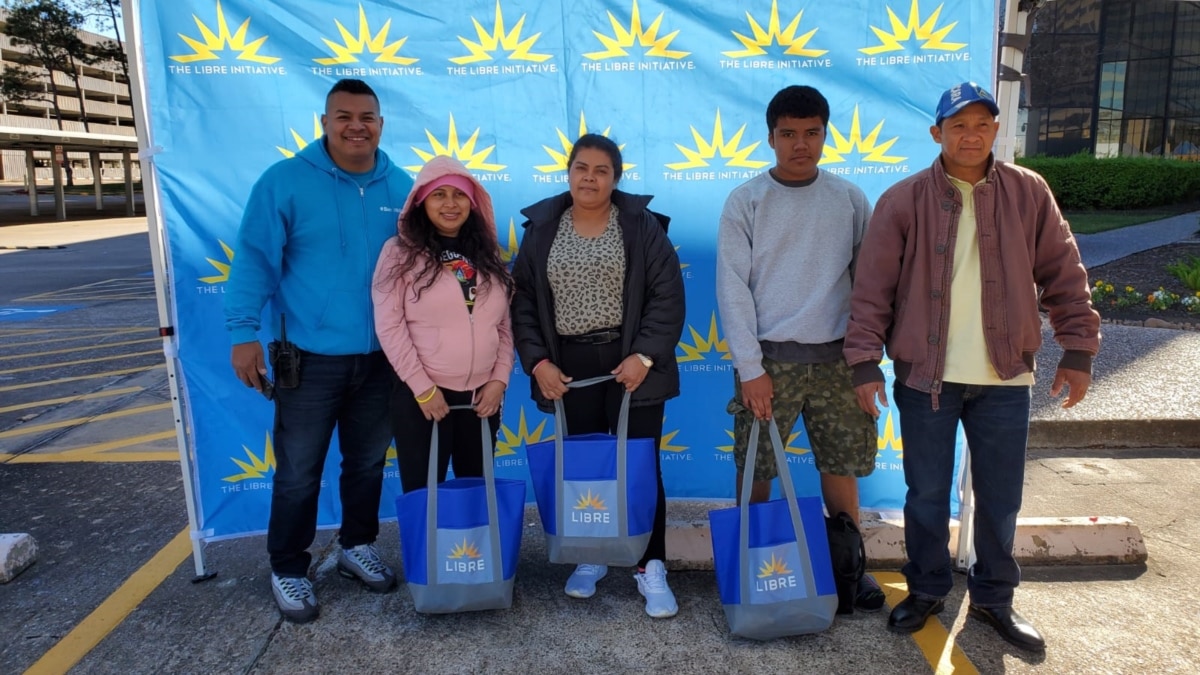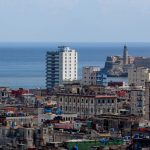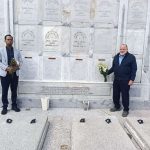A woman retired from her business work, a systems engineer who translates from miskito to English and a lawyer who organizes training workshops and collecting humanitarian aid have something in common: they are Nicaraguans who help their fellow citizens when they arrive in the United States.
A ‘great’
Anita Wells left Nicaragua more than 40 years ago and now that she has left behind her work as a business woman in the United States, she has reinforced her passion by helping in various ways the new wave of Nicaraguans who arrive every day.
Wells has been co-founder since 2018 – along with two other women -, in Virginia, of the organization Abuelas Unidas por Nicaragua (GrannyNica).
“The beginning was to provide assistance (in 2018 following the protests against the government of Daniel Ortega) to those who were fleeing from Nicaragua to places like Honduras, Guatemala, Mexico. It was not during this migratory era now, but rather it was Nicaraguans escaping repression,” Wells tells the Voice of America.
Their work is focused on finding resources for new immigrants to survive in the early stages, “referring them to other people” to help them move forward, and supporting them through other volunteers for the processing of legal and immigration documents.
Until December 2023 at least 54,000 Nicaraguans They had arrived in the United States through humanitarian parole, according to records from the US Customs and Border Protection (CBP).
“In the last year we have focused on the most vulnerable, of peasant origin, those who do not know the resources, the migratory processes,” he says and gives the example of how he has found cases in which sometimes they put a stamp stamp on them. an entry document into the country “and they think: ‘that’s my asylum.’”
Wells says he has paid more attention to one community in particular among those arriving, the indigenous Miskito people “who don’t speak English and don’t speak Spanish.”
Together with Douglas Rossman, an engineer who has only been in exile for three years and lives in Florida, they have been able to help the immigrants. “We help them fill out their online forms, open their accounts with the immigration service… what a lawyer would do,” he says.
—How one day does Anita get up and start helping immigrants? —, investigate the Voice of America.
—I never left my country, I have carried it in my heart; as he says the song ‘Nicaragua in the suitcase’: “With my country in the suitcase on my chest” – he answers, paraphrasing the Nicaraguan singer-songwriter Jandir Rodríguez.
An inspiration to drive to help in 2018 was the outbreak of protests in Jinotega, as in many parts of Nicaragua. “I was in line when they killed the first little boy,” she says.
At the end of December 2018, a report of the Inter-American Court of Human Rights (IACHR) ruled that the government’s response to the protests left at least 325 dead and more than 200 injured.
President Ortega then argued that his actions responded to an alleged coup attempt, something that was rejected by the international community due to the absence of evidence. Nicaragua ceased to be a member of the Organization of American States (OAS) on November 19, 2023, two years after Daniel Ortega decided to retire from the organization, which he accused of “interference and intervention.”
In one day he receives requests for help from up to five cases, he explains. “Don’t think that everyone has suffered the fate of those who know how to get help and assistance,” he concludes.
‘A saving angel’
Douglas Rossman is originally from the Miskito ethnic group and comes from the Caribbean coast of Nicaragua. He is 40 years old and has become “a saving angel” for Nicaraguan immigrants of the same origin who seek asylum; He has already served from Florida in the courts of law by translating from that language to English before judges.
The “savior angel” award goes to Anita Wells, who she assists by telephone or online.
Grossman regularly participates in advice on immigration procedures and completely free consultations to provide online access to immigrants.
“I decided to get more involved with people who are coming from Nicaragua to help them in the process because I know my Miskito people and they have a lot of difficulty with the language and being in a country that is not theirs,” he explains to the VOA.
For Rossman, settling in Everglades City, southwest Florida, has not been easy. At first he was a crab fisherman, but then he began working as a waiter in a restaurant, until today when he also combines those tasks with his remote consulting company on computer solutions and as a website designer.
One of those opportunities that he had been waiting for since he decided to help other immigrants came to him just a week ago. A case in the Miami Court, where the person – whom he does not identify because he did not have his authorization – “was defrauded,” he claims, by someone who processed the documents for political asylum but the formal request for the case was never subdued
“The judge made me come forward, she swore me in as a translator from Miskito to English, for the purposes of the Court for that day. I felt… not like an achievement for me, but that I was useful,” she celebrates.
Immigrants as “the pillar” of the community
Manuel Prado is a Nicaraguan lawyer who lives in Houston, Texas; He arrived there at the age of three in 1981 and today is the president of the Nicaraguan American Foundation for the Development of Education and Culture (Funadec), an organization created in 2006.
Prado, who on a previous occasion told the VOA about his work with immigrants, he comments on the growing flow of Nicaraguans into Houston today.
“They see Nicaraguans like they have never seen before,” he explains.
Prado points out that last December they delivered 98 family basic basket modules to those who needed them. “It has been a boom that benefits us, by having these people who are professionals: doctors, professionals with even a double master’s degree. “We have seen growth in the Nicaraguan labor market here.”
After implementing a survey, Prado says, they got to work offering English language courses, training on the United States economic system for new immigrants, and others. The English courses are Level 1, and up to 19 participants attend each Saturday in two sessions, he points out.
For Prado, the satisfaction also lies in the fact that now “the transition is not as complicated as in the 1980s, now there is a community that welcomes them. And I believe the blessing is mutual. The number of professionals there are is a pillar for us,” she concludes.
Connect with the Voice of America! Subscribe to our channelsYoutube, WhatsApp and to newsletter. Turn on notifications and follow us on Facebook, x and instagram.

![“We have focused on the most vulnerable": how the Nicaraguan diaspora in the US helps new immigrants Douglas Rossman (center, background), volunteer and activist who has focused on advising and supporting Nicaraguan immigrants who arrive in various parts of the United States. [Foto cortesía].](https://gdb.voanews.com/01000000-0aff-0242-59a5-08dc58ee13f0_w250_r1_s.jpeg)
![“We have focused on the most vulnerable": how the Nicaraguan diaspora in the US helps new immigrants The Nicaraguan American Foundation (Funadec) delivers humanitarian aid to immigrants in Houston, Texas, December 2023. [Foto cortesía].](https://gdb.voanews.com/01000000-0a00-0242-58bf-08dc58edeb2f_cx0_cy18_cw100_w250_r1_s.jpeg)

















